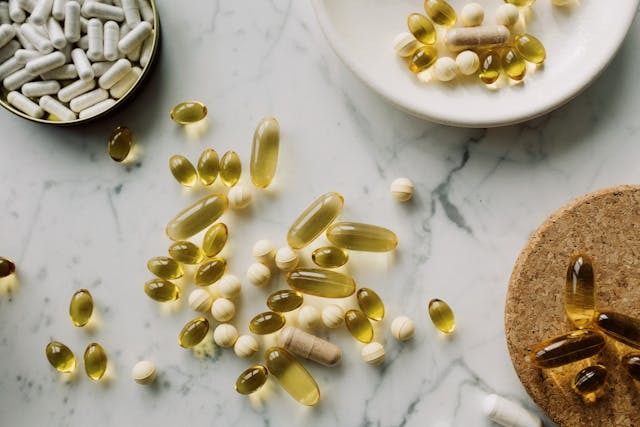
Supplements That Work
As a gym owner, you’re not just running a place where people lift weights - you’re a trusted source of guidance for your community. Whether your clients are chasing fat loss, muscle gain, or just trying to feel better and age well, they look to you for more than workouts. They want to know what works - and what doesn’t - when it comes to supplements, especially those aimed at long-term health and longevity.
The supplement world is crowded, confusing, and often overhyped. But a handful of ingredients have stood up to serious scientific scrutiny. These are the ones worth keeping on your radar and recommending to your clients when the goal is feeling good now and building lasting health.
Let’s break it down.
🧠 The Big Picture: Why Supplements Matter (But Don’t Fix Everything)
Before diving into specific products, it's worth reminding your clients that supplements are just that - supplements, not shortcuts. They work best when built on top of solid basics: strength training, quality nutrition, sleep, and recovery. But when used wisely, they can help fill gaps and give your clients a small but meaningful edge - especially when it comes to brain health, joint support, inflammation, and energy levels.
💪 The Core Five: Supplements with Serious Backing
These are the ones you can recommend with confidence. They’re safe for most people, affordable, and supported by solid science.
Creatine Monohydrate
For: strength, cognitive health, aging muscle
You already know creatine builds muscle. What most people don’t know? It may also protect the brain, improve recovery, and help maintain lean mass as we age—making it a longevity tool, not just a performance enhancer.
Dose: 3–5g/day
When: Anytime, consistency matters more than timing
Who it’s for: Nearly everyone—especially vegetarians, older adults, and anyone lifting
💡 Pro tip: Creatine is a great place to start if a client is skeptical about supplements. It’s one of the most studied in the world.
2. Vitamin D3 (Ideally with K2)
For bone health, immunity, hormone support
Many clients—especially those in northern climates or who work indoors—are chronically low in vitamin D. Deficiency can lead to fatigue, joint pain, and immune issues. A simple D3 supplement can help, especially when paired with K2 to support calcium regulation and heart health.
Dose: 2,000–5,000 IU/day (check levels if possible)
When: With food
Who it’s for: Most adults, especially in winter or with limited sun exposure
3. Magnesium (Glycinate or Threonate)
For sleep, stress, muscle recovery
Magnesium plays a role in over 300 processes in the body, including muscle contraction, sleep quality, and mood regulation. Many clients—especially active ones—are deficient and don’t know it.
Dose: 200–400mg/day
When: At night for better sleep
Who it’s for: Anyone who’s stressed, has trouble sleeping, or trains hard
💡 Avoid magnesium oxide—it’s cheap and poorly absorbed. Go for glycinate or threonate for best results.
4. Omega-3s (EPA + DHA)
For inflammation, joint support, heart and brain health
Omega-3s reduce inflammation and support nearly every system in the body. If your clients don’t eat fatty fish 2–3 times a week, they’re likely not getting enough. Supplementing can protect joints, improve focus, and reduce heart disease risk.
Dose: 1,000–2,000 mg/day of combined EPA and DHA
When: With a meal that contains fat
Who it’s for: Almost everyone, especially those with joint pain or brain fog
5. Protein Powder
For muscle growth, satiety, recovery
It's not technically a “longevity” supplement—but we’d argue it belongs here. Maintaining lean muscle mass is one of the most significant predictors of long-term health and independence as people age. If clients aren’t getting enough protein from food, a scoop of high-quality whey (or plant-based alternatives) can make all the difference.
Dose: 20–40g per serving, depending on needs
When: Post-workout or to fill a meal gap
Who it’s for: Busy clients, older adults, or anyone under-eating protein
🧬 A Few Targeted Additions (Optional, But Interesting)
These supplements aren’t for everyone, but some clients may be curious—especially the biohackers or older adults looking for every edge.
CoQ10: Great for clients on statins or over 50; supports cellular energy.
Ashwagandha: An adaptogen that helps manage stress and cortisol.
Probiotics: Gut health is emerging as a key factor in everything from inflammation to mood.
Only recommend these if your client has a specific need or interest—and encourage them to track how they feel over time.
🚫 What to Skip (or Be Skeptical About)
Your clients see influencer ads for NMN, resveratrol, turmeric lattes, NAD sprays, and mushroom blends. Some of this stuff is promising. But most has weak human data or inconsistent effects.
If it’s:
Crazy expensive
Based on rat studies
Promising a "hack" or a miracle
…you probably don’t need it (yet). Stick to the basics that work.
🧪 The Real Magic: Personalization + Consistency
Supplements don’t need to be complicated. However, they need to be used consistently and tailored to the individual.
As a gym owner, here’s how you can help:
Start with the fundamentals: D, magnesium, fish oil, creatine, and protein
Ask questions about their diet, lifestyle, sleep, and stress
Recommend testing when appropriate (like blood vitamin D levels)
Partner with a dietitian if your clients need more help navigating choices
Final Takeaway: Simplicity Scales
You don’t have to be a supplement guru to give great advice. Start with what’s safe, simple, and well-researched. Keep the focus on building strong habits and helping your clients feel better now while stacking the deck for the long game of health.
When in doubt, remember: you’re not just helping people look good. You’re helping them live better and longer - a pretty great legacy.


